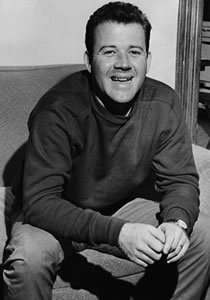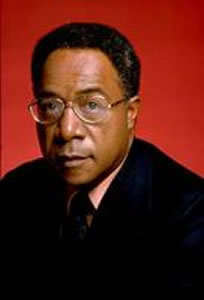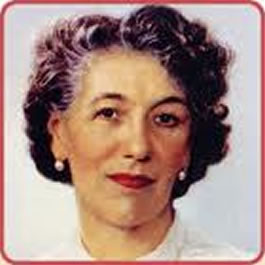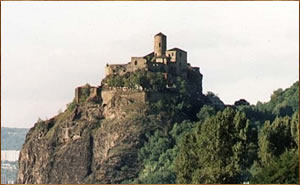De Amerikaanse schrijver en essayist Andre Dubus werd geboren op 11 augustus 1936 in Lake Charles, Louisiana. Zie ook mijn blog van 11 augustus 2009 en ook mijn blog van 11 augustus 2010.
Uit: Killings
‘He walks the Goddamn streets,’ Matt said. ‘I know. He was in my place last night, at the bar. With a girl.’ ‘I don’t see him. I’m in the store all the time. Ruth sees him. She sees him too much. She was at Sunnyhurst today getting cigarettes and aspirin, and there he was. She can’t even go out for cigarettes and aspirin. It’s killing her.’ ‘Come back in for a drink.’ Matt looked at his watch. Ruth would be asleep. He walked with Willis back into the house, pausing at the steps to look at the starlit sky. It was a cool summer night; he thought vaguely of the Red Sox, did not even know if they were at home tonight; since it happened he had not been able to think about any of the small pleasures he believed he had earned, as he had earned also what was shattered now forever: the quietly harried and quietly pleasurable days of fatherhood. They went inside. Willis’s wife, Martha, had gone to bed hours ago, in the rear of the large house which was rigged with burglar and fire alarms. They went downstairs to the game room: the television set suspended from the ceiling, the pool table, the poker table with beer cans, cards, chips, filled ashtrays and the six chairs where Matt and his friends had sat, the friends picking up the old banter as though he had only been away vacation; but he could see the affection and courtesy in their eyes Willis went behind the bar and mixed them each a Scotch and soda; he stayed behind the bar and looked at Matt sitting on the stool. ‘How often have you thought about it?’ Willis said. ‘Every day since he got out. I didn’t think about bail. I thought I wouldn’t have to worry about him for years. She sees him all time. It makes her cry.’ ‘He was in my place a long time last night. He’ll be back.’ ‘Maybe he won’t.’ ‘The band. He likes the band.

Andre Dubus (11 augustus 1936 – 24 februari 1999)
In 1963
De Amerikaanse schrijver Alexander Palmer Haley werd geboren in Ithaca (New York) op 11 augustus 1921. Zie ook mijn blog van 11 augustus 2009 en ook mijn blog van 11 augustus 2010.
Uit: Roots
“” Omoro then walked out before all of the assembled people of the village. Moving to his wife’s side, he lifted up the infant and, as all watched, whispered three times into his son’s ear the name he had chosen for him. It was the first time the name had ever been spoken as this child’s name, for Omoro’s people felt that each human being should be the first to know who he was.
The tan-tang drum resounded again; and now Omoro whispered the name into the ear of Binta, and Binta smiled with pride and pleasure. Then Omoro whispered the name to the arafang, who stood before the villagers.
“The first child of Omoro and Binta Kinte is named Kunta!” cried Brima Cesay.
As everyone knew, it was the middle name of the child’s late grandfather, Kairaba Kunta Kinte, who had come from his native Mauretania into The Gambia, where he had saved the people of Juffure from a famine, married Grandma Yaisa, and then served Juffure honorably till his death as the village’s holy man.
One by one, the arafang recited the names of the Mauretanian forefathers of whom the baby’s grandfather, old Kairaba Kinte, had often told. The names, which were great and many, went back more than two hundred rains. Then the jaliba pounded on his tan-tang and all of the people exclaimed their admiration and respect at such a distinguished lineage.
Out under the moon and the stars, alone with his son that eighth night, Omoro completed the naming ritual. Carrying little Kunta in his strong arms, he walked to the edge of the village, lifted his baby up with his face to the heavens, and said softly, “Fend kiling dorong leh warrata ka iteh tee.” (Behold-the only thing greater than yourself.)””

Alex Haley (11 augustus 1921 – 10 februari 1992)
De Britse schrijfster Enid Blyton werd geboren in Londen op 11 augustus 1897. Zie ook mijn blog van 11 augustus 2009 en ook mijn blog van 11 augustus 2010.
Uit:The Magic Faraway Tree
“” The children read the note one after another. Their eyes began to shine. “Shall we go?” said Fanny. “Better not,” said Jo. “Something silly is sure to happen to us. It always does.”
“Oh, Jo! Do let’s go!” said Bessie. “You know how exciting the Enchanted Wood is at night, too, with all the fairy folk about—and the Faraway Tree lit with lanterns and things. Come on, Jo—say we’ll go.”
“I really think we’d better not,” said Jo. “Dick might do something silly again.”
“I would not!” said Dick in a temper. “It’s not fair of you to say that.”
“Don’t quarrel,” said Bessie. “Well, listen—if you don’t want to go, Jo, Fanny and I will go with Dick. He can look after us.”
“Pooh! Dick wants looking after himself,” said Jo.
Dick gave Jo a punch on the shoulder and Jo slapped back.
“Oh, don’t!” said Bessie. “You’re not in the Land of Do-As-You-Please now!”
That made everyone laugh. “Sorry, Jo,” said Dick. “Be a sport. Let’s all go to-night. Or at any rate, let’s go up the tree and hear what Silky and Moon-Face can tell us about this new land. If it sounds at all dangerous we won’t go. See?”
“All right,” said Jo, who really did want to go just as badly as the others, but felt that he ought not to keep leading the girls into danger. “All right. We’ll go up and talk to Silky and Moon-Face. But mind—if I decide not to go with them, there’s to be no grumbling.”
“We promise, Jo,” said Bessie. And so it was settled. They would go to the Enchanted Wood that night and climb the Faraway Tree to see their friends.
It was exciting to slip out of bed at half-past eleven and dress. It was very dark because there was no moon.
“We shall have to take a torch,” said Jo. “Are you girls ready? Now don’t make a noise, or you’ll wake Mother.”

Enid Blyton (11 augustus 1897 – 28 november 1968)
De Duitse schrijver en satiricus Karl Hoche werd geboren in Ústí nad Labem (Schreckenstein), Bohemen, op 11 augustus 1936. Zie ook mijn blog van 11 augustus 2009 en ook mijn blog van 11 augustus 2010.
Uit: Ihr Kinderlein kommet nicht
“”Was war das für ein Mythos? Am Anfang gab es zwei Prinzipien, das Reich des Lichts und das Reich der Finsternis. Der Fürst der Finsternis drang in das Lichtreich ein, ihm stellte sich der von Gottvater gezeugte Urmensch, ein Lichtwesen entgegen. Er und seine Söhne wurden besiegt und von dem Finsterling verschlungen; damit war das Licht gefangen. Der Vater berief den Lebendigen Geist, der den Urmenschen befreite, die Lichtpartikel aber in der Finsternis beließ. Aus einigen Besiegten machte er Himmel und Erde, das Licht nahm er heraus und bildete damit die Sonne und den Mond. Der Fürst der Finsternis wollte auch Lichtgestalten schaffen, er ließ seine Kinder sich paaren und verschlang die Frucht. Dann paarte er sich mit seinem eigenen Weibe und erzeugte den Menschen. Dieser ist also ein Kind der Finsternis, aber er trägt das Licht in sich, das einst in den Söhnen der Finsternis war. Für den Menschen kommt es nun darauf an, durch Befreiung der Lichtpartikel und durch Abstinenz vom Finsteren sich immer mehr dem Lichtgott anzunähern. Der Same enthält das Licht, auch Pflanzensamen. Man aß also Pflanzen, die Samen enthielten, und man befreite seinen eigenen Samen so oft wie möglich aus der Finsternis des Körpers. Die Zeugung aber hätte bedeutet, das Licht erneut in die Gefangenschaft der Finsternis zu bringen.
Bei Lichte betrachtet ist der Manichäismus nichts anderes als eine Fortsetzung der Gnosis mit phantasievolleren Mitteln. Mani liest sich wie Tolkien, und die Zeiten waren damals so mythensüchtig wie heute. Und wieder gab es asketische und geile Manichäer. Die einen wollten mit der Finsternis überhaupt nichts zu tun haben (da ist auch schon wieder die gefährliche Nähe zur christlichen “Jungfräulichkeit”), den anderen ging es darum, so viel Licht wie nur irgend möglich auszusenden, auf daß die Finsternis erleuchtet werde. Und wieder waren beide Richtungen gegen Ehe und Zeugung. […]””

Karl Hoche (Ústí nad Labem, 11 augustus 1936)
De burcht Schreckenstein
